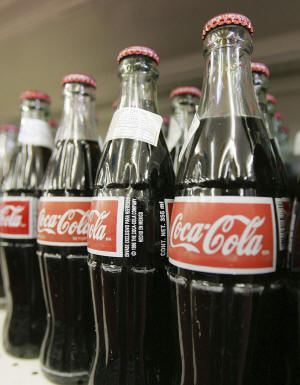Trump says Coke will shift to cane sugar. But increasingly, shoppers
want no sugar in their sodas
[July 18, 2025]
By DEE-ANN DURBIN
The debate over whether Coca-Cola should use high-fructose corn syrup or
cane sugar in its signature soda obscures an important fact: Consumers
are increasingly looking for Coke with no sugar at all.
Coca-Cola Zero Sugar, which was introduced in 2017, uses both the
artificial sweetener aspartame and the natural sweetener stevia in its
recipe. It’s one of Coke’s fastest-growing products, with global case
volumes up 14% in the first quarter of the year. By comparison, the
company’s total case volumes were up 2%.
PepsiCo also noted Thursday that 60% of its sales volumes in major
markets in the second quarter came from low- or no-sugar drinks.
“When you look at colas, the percentage of growth coming from zero sugar
is significant,” said Duane Stanford, the editor and publisher of
Beverage Digest.
Coca-Cola Co. hasn't confirmed a presidential pronouncement
The scrutiny over Coke’s sweeteners began Wednesday, when President
Donald Trump announced that Atlanta-based Coca-Cola Co. had agreed to
switch to using cane sugar in the regular version of its beverage
manufactured in the U.S.
“I have been speaking to Coca-Cola about using REAL Cane Sugar in Coke
in the United States, and they have agreed to do so,” Trump wrote on his
social media site. “I’d like to thank all of those in authority at
Coca-Cola. This will be a very good move by them — You’ll see. It’s just
better!”
Coca-Cola didn’t confirm the change. In a statement, the company said it
appreciated Trump’s enthusiasm and would share details on new offerings
soon.
Stanford said he doubts Coca-Cola will fully shift away from high
fructose corn syrup, which has sweetened Coke in the U.S. since the
1980s. There would be tremendous supply chain and logistics headaches,
he said, and the U.S. doesn't make enough sugar for Coke's needs.

He expects the Atlanta-based company will offer a cane sugar-sweetened
version in the U.S. just like its rival Pepsi has been doing since 2009.
He noted that Coke has indulged U.S. fans by importing Mexican Coke,
which is made with cane sugar, since 2005. Coke positions Mexican Coke
as an upscale alternative and sells it in glass bottles.
A rush to defend high fructose corn syrup
The corn industry wasn’t happy with the speculation. In a statement
Wednesday, Corn Refiners Association President and CEO John Bode said
replacing high fructose corn syrup with cane sugar makes no sense and
would cost thousands of American manufacturing jobs.
Shares in ADM, a maker of high fructose corn syrup, dipped nearly 2%
Thursday after Trump’s announcement.
In a message on X, Coca-Cola defended high fructose corn syrup, saying
it’s no more likely to contribute to obesity than table sugar or other
full-calorie sweeteners.
“It’s safe; it has about the same number of calories per serving as
table sugar and is metabolized in a similar way by your body,” the
company said. “Please be assured that Coca-Cola brand soft drinks do not
contain any harmful substances.”
[to top of second column]
|

Bottles of Mexican Coca-Cola fill a prominent spot on the shelves of
the Tarascas Latino Supermarket in Lawrenceville, Ga., Nov. 3, 2004.
(AP Photo/RicFeld, File)
 The Food and Drug Administration
also says there is no evidence of any difference in safety among
foods sweetened with high fructose corn syrup and those that sugar,
honey or other traditional sweeteners.
US consumers are seeking more options
Soft drink preferences are highly subjective, as anyone who has been
in a Pepsi vs. Coke or 7-Up vs. Sprite debate knows. But recent
trends indicate that Coke and other drink makers need to focus on
the kinds of low- and no-sugar drinks that a growing number of
consumers are seeking, according to Stanford.
He said his data shows original Coke was the top seller by volume in
the U.S. last year, with 19% market share, while Coke Zero Sugar was
seventh and had a 4% market share. But Coke Zero Sugar's share grew
10%, while original Coke's share was flat.
Paige Leyden, the associate director of food service, flavors and
ingredients reports at the market research company Mintel, said
drinks with a health halo like Olipop — which has 1 gram of sugars
compared to original Coke's 65 grams — are also pressuring legacy
soda makers. Mintel expects full-sugar sodas will see a 3.4% rise in
U.S. sales this year, while diet sodas will see 11.8% growth.
Still, nutritionists suggest avoiding added sugars, no matter the
form, since they provide empty calories with no nutrients. The 2020
U.S. dietary guidelines advise people to limit foods and beverages
higher in added sugars, and say children under 2 should not be fed
them at all.
Health Secretary Robert F. Kennedy, whose nutrition views often
diverge from mainstream nutrition science, has spoken out against
sugar. His agency is expected to release updated nutrition
guidelines later this year.
“There’s things we’ll never be able to eliminate, like sugar,”
Kennedy said at an April news conference. “And sugar is poison, and
Americans need to know that.”
Aspartame and other artificial sweeteners are also named as a
concern in a government report Kennedy issued in May.
___
AP Health and Science Editor Jonathan Poet contributed from
Philadelphia.
All contents © copyright 2025 Associated Press. All rights reserved
 |